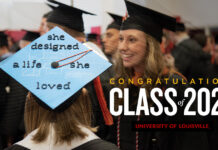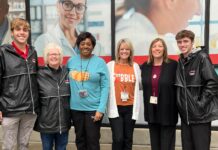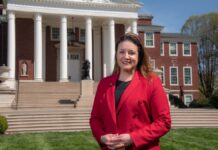
There are some new faces at the Kornhauser Health Sciences Library – they’re all part of the permanent art exhibition, “Change How You See, See How You Change.” Installed in spring 2025, the photo gallery honors local individuals with genetic, physical and intellectual differences, and creates a space for meaningful discussions about disability while fostering deeper learning and connection.
Isabella Gliatti, a UofL student majoring in biology and exhibit volunteer is a featured face in the photo gallery. Originally from Lebanon, Ohio, Gliatti lives with Ehlers-Danlos syndrome, which affects collagen production and leads to chronic pain, joint hypermobility, tachycardia, and fatigue, among other symptoms.
“It’s good for the public to see the unique richness of people with disabilities and that just because people have disabilities, doesn’t mean that they can’t accomplish all different types of things,” Gliatti said.
Training compassionate health care providers
The exhibition was curated by Positive Exposure, an international organization founded by award-winning New York City-based photographer Rick Guidotti. The organization collaborates with hospitals, medical schools, museums and more. Guidotti, who once photographed supermodels, wanted to show the unique beauty and ability within disability.
More than 30 local participants were photographed to create the exhibit at UofL.
Each face in the gallery also displays a digital link to a brief video introducing them in their own words.
Through partnership with Positive Exposure and funding support from the UofL Health Sciences Office of Health Equity and Engagement, the exhibit was brought to Louisville as a collaboration between the UofL School of Medicine Department of Pediatrics and the Kornhauser Library, and includes students, volunteers, physicians and staff.
Faye Jones, pediatrics professor, said the project supports UofL’s mission. “Our holistic approach creates an environment where varied perspectives and backgrounds are valued and ensures that the workforce is equipped to address the health needs of an increasingly diverse population.”
Vida Vaughn, director of the Kornhauser Health Sciences Library, helped to coordinate efforts to bring Positive Exposure to Louisville. “Providing space for this important exhibit aligns perfectly with our goal of promoting patient values as a component of evidence-based practice,” she said. “The beauty of diversity is not just about what makes us distinct, but about how those distinctions create new opportunities for connection and understanding.”

For UofL Department of Pediatrics professors Corrie Harris and Sarah Korte, Positive Exposure became a way to view inclusiveness through the lens of training future compassionate physicians.
Harris, a pediatric hospitalist who works at Home of the Innocents, became familiar with Positive Exposure about six years ago at a conference, and was moved by the message of focusing on the humanity behind diagnosis.
“We really want to remind providers that every patient is a person first — before we get caught up in all the diagnoses and treatments,” she said. “We don’t want to lose sight of the humanity of medicine.”
Korte first discovered the Positive Exposure website during the height of the Covid pandemic when searching for ways to engage students remotely.
She created a project for medical students to choose a participant video from the website and write a reflection, later joining an online discussion group about what they learned. That exercise became a permanent component of the curriculum.
“As health care providers, we often come in with preconceived notions about what we think a patient wants or what we think they should accomplish and don’t ask them what they want,” said Korte. “We need to address our implicit biases and give the patients autonomy to make those decisions about what they want for themselves.”
Recent medical school graduate Sean Woods was the student lead for the Positive Exposure project. He began a residency in pediatric neurology at UofL Health in July 2025.
Woods said the curriculum reflection exercise was revelatory for some and reinforcing for others.
“It’ll make us all better physicians in terms of building relationships with our patients to get an understanding for who they are and what their goals are, and to really work together,” he said.
Reaching the Cardinal community and beyond
Gliatti was invited to volunteer for the project and share her story as a member of Disabled Cards United.
The club is a UofL coalition of disabled students and their allies that work to foster a safe and inclusive environment, promote student led advocacy and provide a space for disabled students to build solidarity.
Gliatti said the Positive Exposure exhibition helps to increase awareness and inclusiveness around both invisible and visible disabilities. She said she has been pleased to not only share her own story but hear the stories of so many others.
“I hope that someone who is in a similar boat can hear my story and think, ‘Hey, this girl has all these struggles, but she’s in college. Maybe I could do that, too?’”
Learn more about the Kornhauser Library’s Positive Exposure exhibit.
Updated Nov. 6, 2025






























